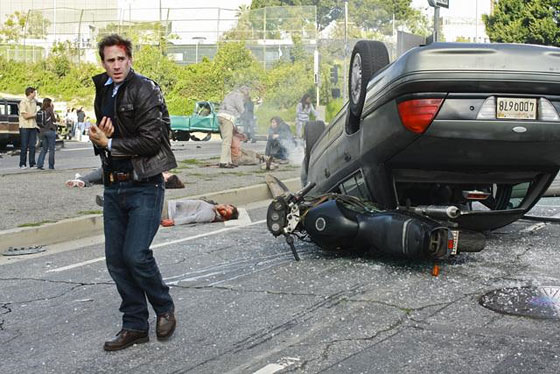
Tonight, FlashForward returns from its winter hiatus to blow your mind with its remaining thirteen-episode arc. Why the long break? Well, apart from avoiding four preemptions during the January to February Olympics ratings war, the writers also likely needed the time to tighten a few scripts ÔÇö hopefully paying close attention to the even-numbered episodes, which, for whatever reason, were the weakest of the opening ten.
In a way, though, itÔÇÖs fortuitous that FlashForward should return now: That 500-pound gorilla of televised science fiction, Lost, is fast approaching its series finale, and while there have been great episodes mixed in with the not-so-great ones, thereÔÇÖs a creeping suspicion that many of the answers weÔÇÖve been obsessing over might not be answered, and that the show is devolving into a chess match between ÔÇ£goodÔÇØ and ÔÇ£evil.ÔÇØ Meanwhile, FlashForward feels securely anchored in its sci-fi and philosophical underpinnings, rigorously speeding us through the mystery of how everyone on the planet passed out and saw themselves six months in the future. So while both shows have their villains, their fake-out villains, and their flawed, reluctant heroes, now would be the time to ask whether FlashForward might just turn out to be a more satisfying experience than Lost.
1. The Fate Issue
For all the crazy time-traveling done by the characters of Lost, the real emotional resonance of the lives they could have led and the choices they have made often comes down to a sideways smirk and ÔÇ£FrecklesÔÇØ remark from Sawyer. Whereas in ten episodes, FlashForward has already started processing some serious shit, including wily Nazis, a dramatic suicide, and a potential battle for the presidency. The characters actually feel like theyÔÇÖre grappling with said serious shit in every episode, rather than moving through a maze.
2. Acting
Michael Emerson, Terry OÔÇÖQuinn, and Matthew Fox, all excellent, have to contend with flashbacks, sideways flashes, and general goofiness on the island. On FlashForward, Oscar nominee Shohreh Aghsashloo (shady Hong Kong operative Nhadra Udaya), Yale drama-school grad and Tony nominee Courtney B. Vance (whom weÔÇÖd like to see get more air time as FBI Field Office Chief Stanford Wedeck), and, of course, SAG Award winner Joseph Fiennes (our protagonist Mark Benford, who can get a little shouty but still holds his own) make a show predicated on people who have glimpsed their future feel realistic, and give us a stake on where things are headed ÔÇö rather than asking us to simply absorb their backstories.
And a special nod should go to Irish actor Brian F. OÔÇÖByrne, who plays a recovering alcoholic dad dealing with the confusion of an Afghan war vet daughter who, essentially, returns from the dead. OÔÇÖByrne has weathered the wild emotions required by the role with a lot of grace and subtlety, and we always look to him to restrain Fiennes when he starts his shouting.
3. Out Lesbians
Janis Hawk (played by Christine Woods) is an awesome FBI agent with a hot girlfriend (Navi Rawat); she was shot in the stomach but still managed to get pregnant. Somehow in its six seasons, having introduced well over a hundred characters, Lost managed only ever to write in one gay character: Tom Friendly, the scary bearded guy from the Others whom we see back on the mainland with a boyfriend in a single episode. And come on ÔÇö Boone? Ana Lucia? Both are clearly in denial.
4. Kangaroo Versus Polar Bear
A kangaroo bounced past Fiennes in the pilot, and we know it signifies something important. Sort of like that polar bear on Lost ÔÇö except weÔÇÖre confident it will come back in a concrete way.
5. You Might Learn Something!
The final thirteen episodes of the season may just give the viewing public a primer in quantum theory, specifically the concept of quantum entanglement, which EWÔÇÖs Jeff Jensen says might explain why some peoplesÔÇÖ flashes (like ÔÇ£PresidentÔÇØ Joyce ClementeÔÇÖs) conflict with others.
Related: FlashForward Recap: All Hail Squirrelio
7. The Honeymoon Stage
After six seasons building toward some kind of all-encompassing rapture with a God-like figure at its center, LostÔÇÖs finale almost certainly promises more than it can deliver. Those of us who have made the commitment will still watch it, of course, but weÔÇÖre still getting to know FlashForward, and the answers to our questions are coming at a satisfying clip, rather than spinning out of control.

